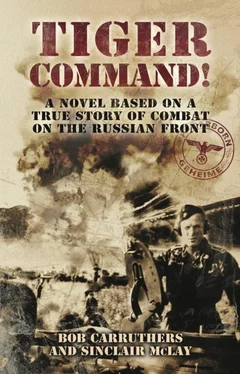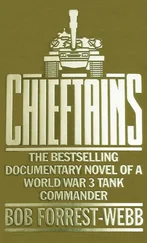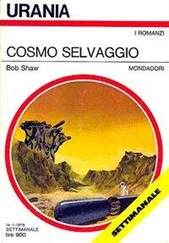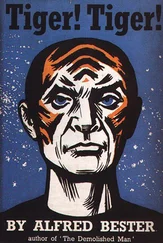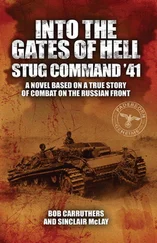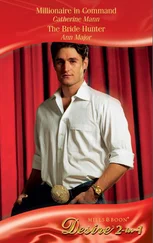“What are we doing?”
“Fifty-five,” said Wohl. “Hold tight, here we go!”
As sixty tons of steel crashed into the lighter machine, the box structure of the main hull immediately gave way and collapsed inwards. The turret was forced from its mounting ring and the far side hull was forced outwards, leaving the Mark IV a flattened heap of junk.
Alerted by the sound of the crash, the assembled staff officers turned as one, but no one spoke. They simply could not believe what they were witnessing. They watched open-mouthed in stunned silence as the Henschel machine reversed over the wreckage, crushing the turret, then turned towards them before rolling swiftly forward and finally drawing up in front of the Führer. As the heavy tank drew to a halt, von Schroif jumped down from his hatch and saluted the Führer.
“Birthday greetings, mein Führer… overrun test completed.”
Suddenly the cameras and the Propaganda Kompanie movie crew were focused on von Schroif and his crew.
“It was certainly conclusive! Germany needs men of action,” replied the Führer. “With this combination◦– you, your men, and this fine new tank◦– I think we may have something for the untermensch to think about. But husband this new weapon carefully. It may have many opponents, but it will have a few brothers.”
“We will, mein Führer,” replied von Schroif.
“We will have to find a soldier’s name for this beast… do you have one in mind?”
“Yes, my Führer”.
“Well, go ahead, commander.”
“We call it the Möbelpackwagen.”
There was a long pause. Hitler was obviously unimpressed. Eventually, he spoke. “The furniture van? Oh no, that won’t do at all.”
Hitler paused briefly for thought, and then began again.
“You and your crew have demonstrated this wonderful new German weapon. You fought like tigers at Rostov. You showed tigerish courage when all seemed lost to you. The Mark VI should have a name that befits its predatory nature.” Turning towards a smiling Arnholdt, he announced his decision. “Dr Arnholdt, the Henschel VK 45.01 shall be informally known as the Tiger.” But Hitler wasn’t finished. He turned once more to von Schroif and his crew. “…and you shall be the first of the Tiger men!”
With that, Hitler swept off towards his headquarters, trailing staff officers in his wake.
A stunned von Schroif was faced by the microphone of a Propaganda Kompanie. As the camera whirled away, he began trying to compose rational answers to the questions.
*
Dimitri Korsak was not in a patient mood. The workshop was going as fast as they could, but he had a score to settle and there was no time to lose. Captain Androv had pulled out all the stops to have a new barrel delivered. The final adjustments to the main gun of the KV-1 were nearing completion. Soon it would be fine-tuned to his satisfaction. The reinforcements had brought his company up to strength, and he still had his line to the divisional artillery. If necessary, he could call upon any amount of firepower, so there was plenty of muscle at his disposal, but caution urged that he use his resources sparingly. The events at Hill 15 outside Rostov had been embarrassingly close to a defeat. This time, there must be no mistake.
It was infuriating that he still did not have a full complement of radio-equipped tanks. He was suspicious that he was not being given the resources that Moscow had promised. If he was being sold short, the reckoning with those responsible would be sudden and vicious, but that was a score to be settled on another day. The facts that took up all of his thoughts were that only two of the tanks at his disposal had the means of both sending and receiving radio communications, twenty-three could receive but not send, and the remaining thirty still used signal flags.
As usual, all the machines provided were T-34 types, whereas Korsak swore by the KV-1. He could have spent time and effort arranging a complex method of intercommunication and response to suit the changing battlefield situation, but he knew he was not working with the finest material; the crews only understood how to advance with dogged courage, and tactical finesse was out of the question in any event. It was obvious that the only real option was to use his superior numbers to bludgeon the enemy into submission. The obvious route was to agree a simple but strict battle plan, and stick to it.
Korsak’s intelligence told him that von Schroif had been transferred back to Germany, which left his old battalion vulnerable to counterattack, but, even with the less than gentle prodding from Moscow, it had taken a week to assemble a strike force. As the ground dried out it was clear that the fascists were going to throw themselves against Rostov once more. Korsak had prevailed in the rough and tumble game of politics, and against the local Russian commander, who had reluctantly weakened his front. He had received the messages from Viper. There was to be another German attempt at Hill 15 with tanks and assault guns. Korsak knew that the German attack would be preceded by a major bombardment lasting two hours, and that the tanks would then advance under a heavy smoke screen.
The attack had twice been postponed due to wind conditions, but as dawn broke the new day promised to be a beautiful still spring morning, and when the first German range-finding shells began to scream into the Soviet position, Korsak sensed that his time had come.
The German bombardment grew in intensity. First it was mortars and infantry guns of increasing calibre, then the 150 mm guns began to add their weight to the barrage. A wall of explosions marked the edge of a ferocious barrage, and the concussion caused by the heaviest shells reached far beyond the front lines to pound the chests of Dimitri Korsak and his waiting attack force. The shocking force of the initial bombardment was unimaginable, but astonishingly it built over the next hour and grew in intensity as more and more batteries joined in. Soon Korsak was able to discern the unmistakable punch of the massive shells from the 210 mm heavy howitzers as they added their fire to the appalling maelstrom of steel and high-explosive. The dirty grey-brown plumes of smoke climbed into the sky and, on this windless morning, towered over the front line like an immense wall of a castle built for giants.
Korsak was disconcerted, but not surprised, when his radio communication with the front line abruptly ceased. Nothing could be expected to survive under a bombardment of such intensity. Still he watched and waited. Finally, as the intense shelling began to overwhelm the senses, there came the gentle plopping sound of smoke shells hitting the soft earth, and a cloud of pure white smoke began to spread from the foot of the brown wall. The time had come. Korsak gave the signal and fifty Soviet tanks began to roll forward into position, just below the crest of the hill which stood between the Russians and the German front lines.
Korsak crept his KV-1 to the crest of the hill; he was now just 2000 metres from the front line. At first the field seemed empty, save for a few Soviet refugees who could be seen crawling back from the bombardment, but as the fire slackened there came the sound of German tank engines. Finally, the shape of a Mark IV emerged from the stillness of the cloud of smoke. It stopped while its machine guns took the fleeing Russians under fire, sending the distant figures of men spinning to the ground. Its stubby main gun spat its message of death towards a further group of fugitives.
Korsak knew that he could potentially destroy the German tank. At this distance, the German had no chance of hitting him. He, on the other hand, with his long-barrelled 76 mm main gun, could destroy the Mark IV, but he chose to wait. The trap had been baited and was now about to be sprung. He smiled grimly to himself as he noted that, on each side of the lead tank, other German tanks were beginning to emerge from the smoke.
Читать дальше
